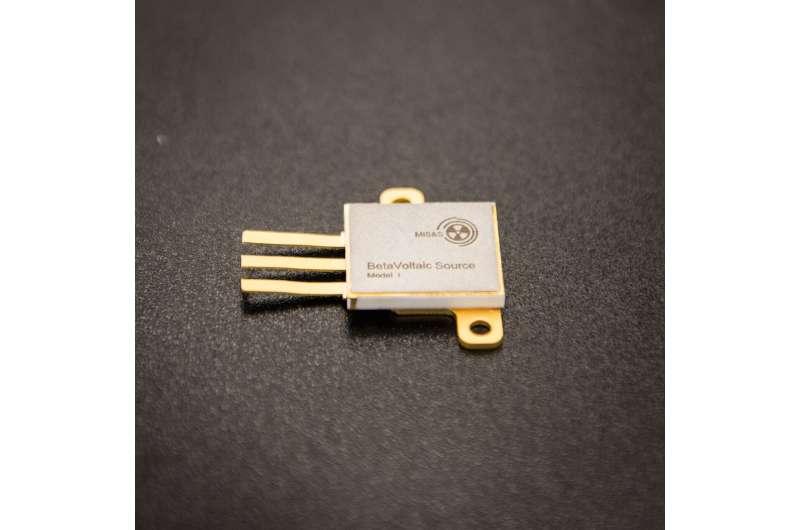Scientists develop an economical atomic battery with power increased by 10 times
By: The National University of Science and Technology (TechXplore)


Another small scale betavoltaic or atomic battery. Atomic batteries would be microscale power generation.

Scientists from NUST MISIS have presented an innovative autonomous power source: a compact atomic battery that can last up to 20 years. Due to the original 3-D structure of the beta-voltaic element, its dimensions have decreased by three times, the specific power has increased by 10 times, and the cost has decreased by 50%. The results have been published in the international scientific journal Applied Radiation and Isotopes.
The original device uses the microchannel 3-D structure of a nickel beta-voltaic element. Its peculiarity is that the radioactive element is applied on both sides of the so-called planar p-n junction, which simplifies the cell manufacturing technology, as well as the control of the reverse current that steals the battery power. The special microchannel structure provides an increase in the effective conversion area of the beta radiation by 14 times, which results in an overall increase of current.
"The output electrical parameters of the proposed design were: short-circuit current IKZ—230 nA /cm2 (in the usual planar construction—24 nA), the final power—31nW /cm2, (in the planar one—3nW). The design allows to increase the efficiency of converting the energy released during the decay of a β-source into electricity by an order of magnitude, which in the future will reduce the cost of the source by about 50% due to the rational use of an expensive radioisotope,'' said one of the developers Sergey Legotin, Associate Professor of the Department of Semiconductor Electronics and Physics semiconductors at NUST MISIS.
At the same time, the development will make it possible to increase the specific power by an order of magnitude, due to which the weight and dimensions of the batteries based on them will decrease three times while maintaining the required output power level.
The battery can be used in several functional modes: as an emergency power supply and temperature sensor in devices used at extreme temperatures and in hard-to-reach (or completely inaccessible) places: in space, under water, in high-altitude areas.
At the moment, the developers are completing the procedure for international patenting of the invention, and the device itself has already been recognized by foreign experts. In particular, in the review of the international marketing research agency Research and Markets, NUST MISIS has been named one of the key players in the global betavoltaic batteries market. The university ranks among such companies as City Labs, BetaBatt, Qynergy Corp and Widetronix.
The review indicates that the development of NUST MISIS scientists—a battery based on beta-voltaic cells (BVE) - has great potential since the demand for reliable batteries with a long service life is growing in all industries. Taking into account the unique characteristics—small size and safety—the development of NUST MISIS scientists will be able to occupy a significant share of the power supply market.

Tags
Who is online
476 visitors


Keep the battery when the iPhone is obsolete.
Remember when the US was the country with such innovations? Now it's Russia of all places coming up with such technology. This country is seriously losing its science and technological acumen.
The United States stepped back from applied science when the Soviet Union collapsed. Industrial development depends upon applied science so it shouldn't be surprising that developing countries will begin rivalling the United States. Now the United States is being surpassed by South Korea and India in applied science.
While that might be a part of it, it's also too simple a reason. Technological and scientific advancements feed economical advancements too, and vice versa. It's not so much we've stepped back from science, but rather people have been continuously dumbing down and increasingly resistant or hostile towards science. The lack of a scientifically competitive "foe" like the former USSR might have started the decline, but it's peoples apathy or hostility towards science (whether politically and/or religiously motivated) which has hastened our decline. To the point where other countries are outpacing us.
The United States has not stepped back from science; that's a misrepresentation of what has happened. The United States shifted emphasis toward fundamental and theoretical science while stepping back from applied science.
The United States really has significantly increased public funding for fundamental and theoretical science across many more scientific disciplines. The increased competition for public funds across many more scientific disciplines has been an incentive to reduce public investment in applied science. Since more scientific disciplines are competing for public funding, it has been necessary to slice the pie into smaller pieces.
The political argument has been that the private sector would replace public funding for applied science. But relying on the private sector to fund applied science won't work because of the commercial desire to protect intellectual property.